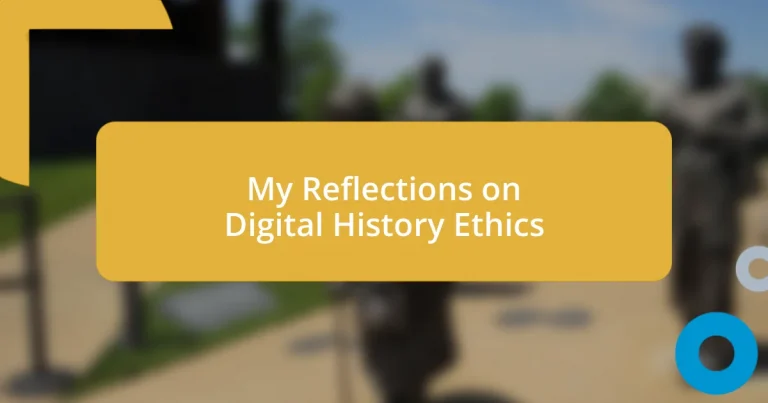Key takeaways:
- The importance of informed consent and ethical representation in digital history projects is crucial for building trust with communities and preserving their narratives.
- Ethical standards guide the integrity, inclusivity, and accountability of historians, ensuring diverse voices contribute to the historical record.
- Engagement with digital communities fosters critical conversations about representation and ethics, highlighting the need for collaboration and respect in digital spaces.
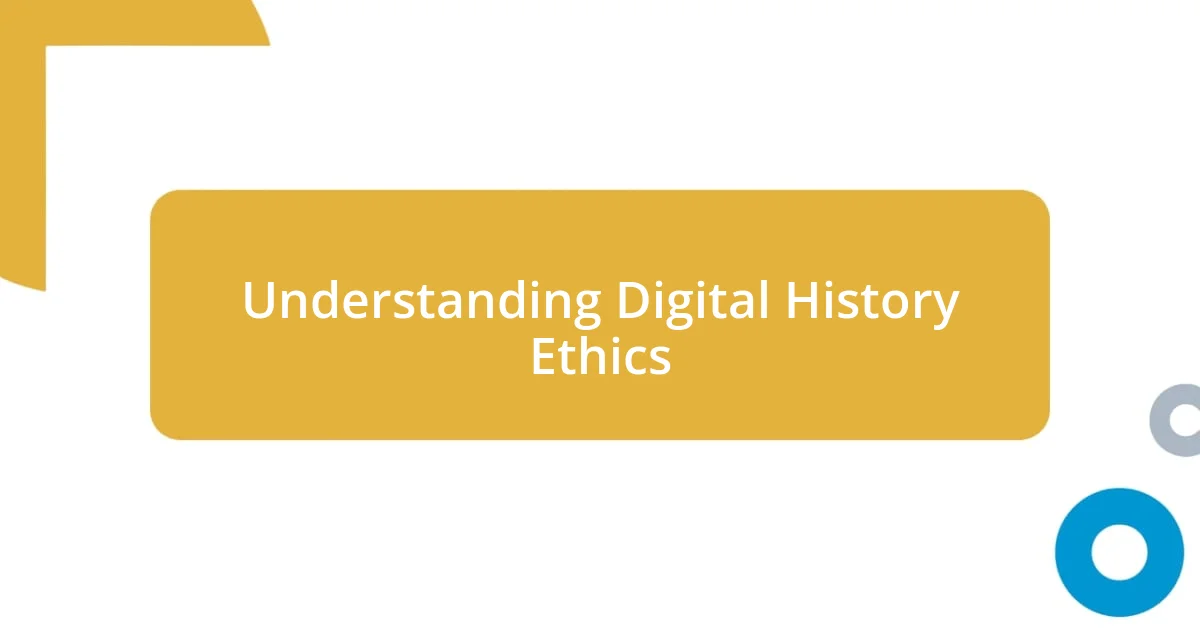
Understanding Digital History Ethics
When I first delved into digital history, I was struck by the responsibility that comes with preserving and interpreting our past in a digital format. It’s not just about collecting data; it’s about ensuring that the stories we tell honor the complexity and nuances of historical events. Have you ever found yourself questioning whose voices are represented in this digital realm, and who might be left out?
One aspect of digital history ethics that resonates deeply with me is the idea of consent, especially when it comes to sharing personal stories or sensitive information. I remember a project where we included interviews with community elders about significant events. It felt vital to seek their permission—after all, these were their memories, their histories. How can we build trust and respect in this digital landscape if we don’t prioritize these ethical considerations?
Additionally, I often reflect on the implications of bias in digital history archives. Algorithms can unintentionally skew narratives, privileging certain perspectives over others. I wonder, as we curate digital collections, how can we ensure that we create a more inclusive and equitable representation of history? Recognizing our own biases in this work is crucial—after all, the stories we choose to highlight shape how future generations understand the past.
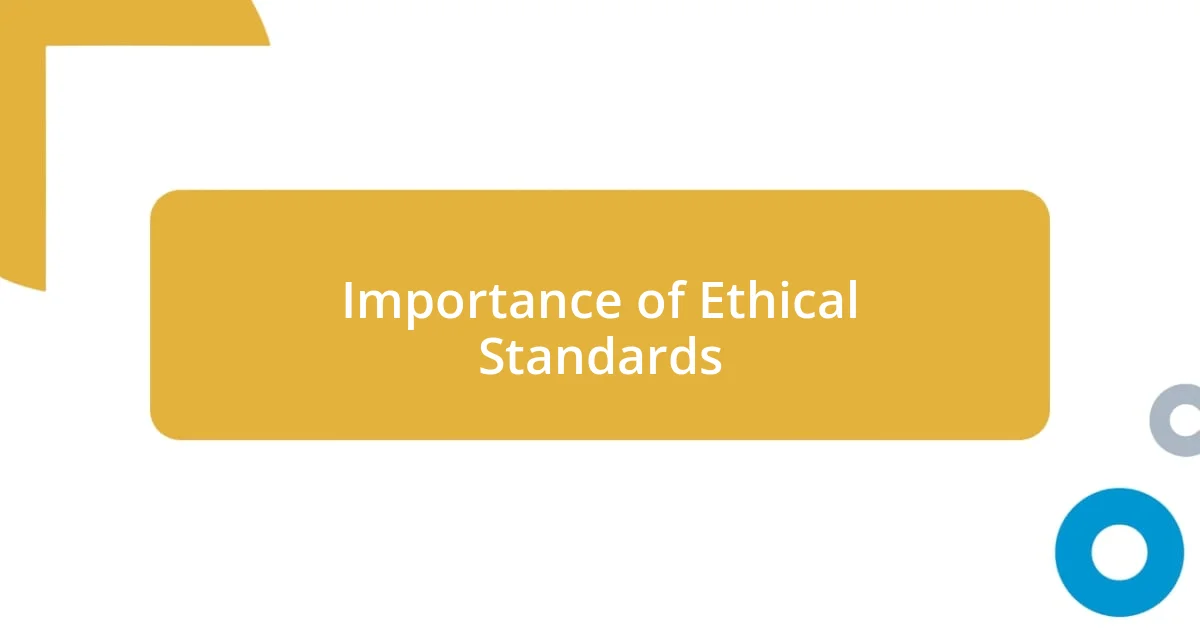
Importance of Ethical Standards
Ethical standards in digital history are crucial for ensuring the integrity of historical narratives. From my experiences, I’ve learned that adhering to these standards promotes accountability among historians and institutions. When I was involved in a project that analyzed social media archives, I realized how easily misinformation could spread if ethics were disregarded. Proper verification methods are essential, and without them, we risk perpetuating false narratives that could tarnish the past.
In reflecting on the importance of ethical standards, I often think about the role of access. Ethical considerations ensure that all individuals have the right to contribute to and consult digital history resources, preserving a diverse range of voices. During my time volunteering at a local history center, we developed guidelines to ensure that marginalized communities felt included. This commitment fostered a sense of ownership and belonging, which is vital when sharing history.
Ultimately, ethical standards are not just policies; they represent the core values guiding our work. They shape our responsibilities towards the communities we engage with and the narratives we choose to present. I’ve often contemplated how these standards can evolve as technology advances. Will our future archivists uphold these values, or will they get lost in the allure of innovation? It’s an ongoing conversation that I believe we must continue.
| Aspect | Importance |
|---|---|
| Integrity | Ensures accurate representation of historical narratives. |
| Inclusivity | Encourages participation from diverse communities. |
| Accountability | Promotes responsible scholarship and research practices. |
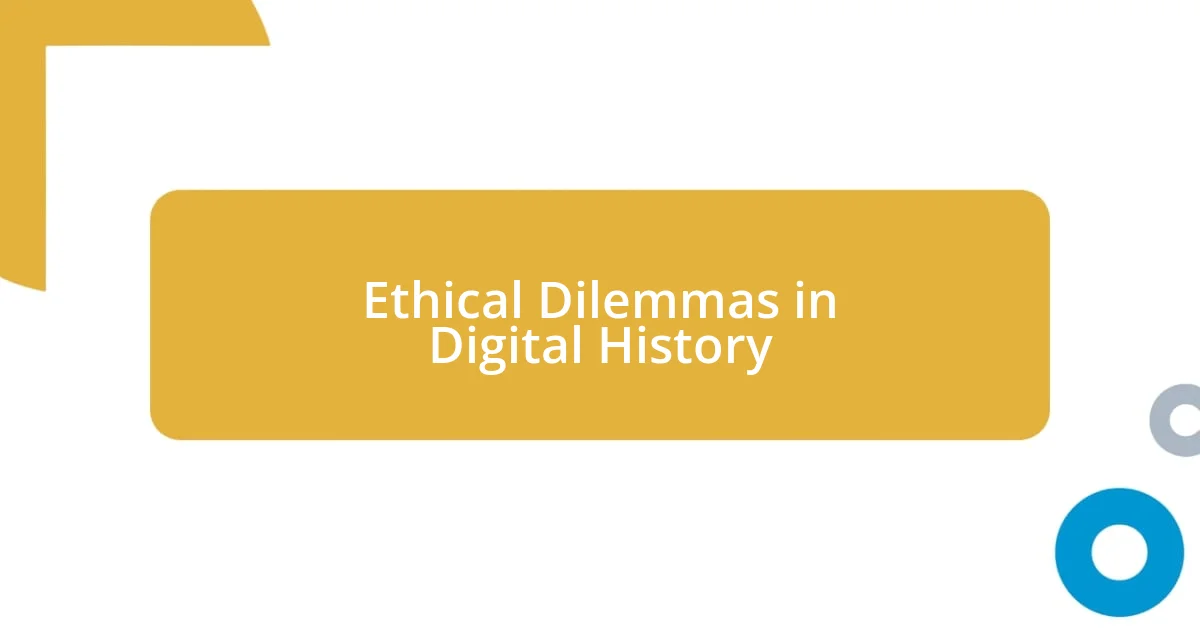
Ethical Dilemmas in Digital History
One of the most pressing ethical dilemmas in digital history arises from the question of representation. I remember a project where we digitized a collection of oral histories from a marginalized community. As we worked, I felt a growing unease about how our decisions influenced which voices were prioritized. It’s unsettling to realize that one wrong choice could erase significant narratives. Balancing visibility and accuracy is tough; it’s a delicate dance that requires constant self-reflection and openness to critique.
- Informed Consent: Engaging with participants about how their stories will be shared to prevent exploitation.
- Narrow Representation: Understanding that certain groups may be overlooked in digital archives, which can skew historical understanding.
- Potential for Misinformation: Acknowledging how the rushed pace of digital projects may compromise rigorous historical verification.
Another ethical dilemma that frequently occupies my thoughts is the impact of metadata. While it’s a technical term for data about data, it shapes how we perceive and access history. I once spent an afternoon sifting through archival records where the accompanying metadata was vague or misleading. Frustration bubbled up as I struggled to piece together stories. Without transparent and accurate metadata, we not only misrepresent the past but also limit the ways future generations can engage with it. What does it mean for historical narratives when the tools we’re using are flawed? It’s a question that demands our attention as digital historians.
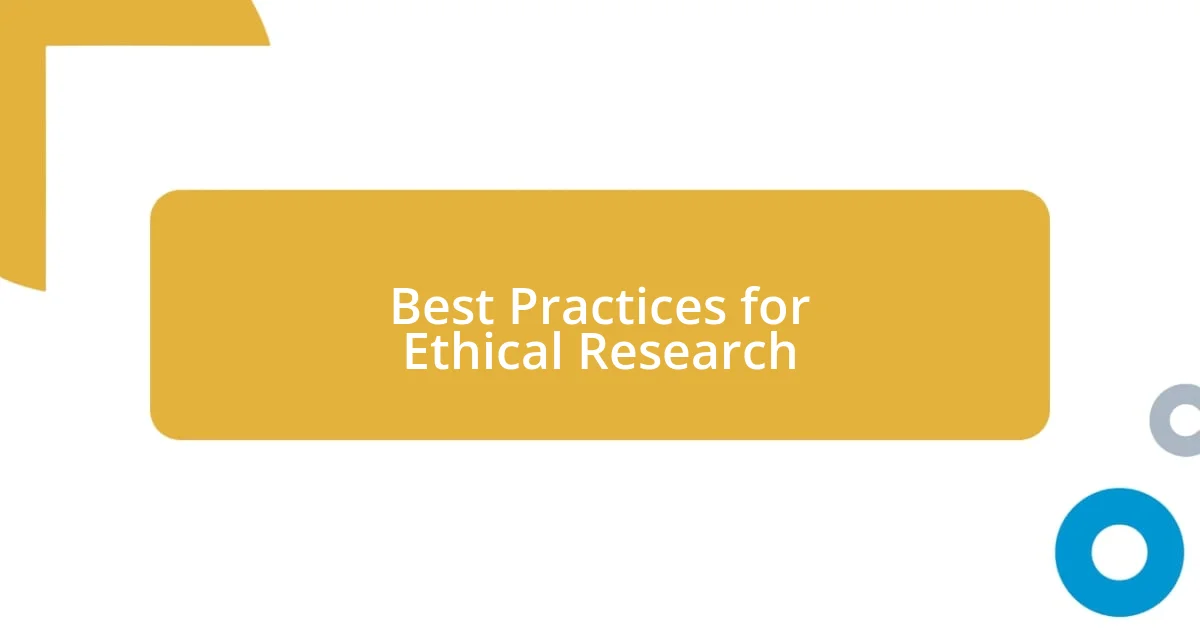
Best Practices for Ethical Research
One of the best practices I advocate for in ethical research is prioritizing informed consent. I recall a project where I interviewed local historians about their experiences preserving community history. Before I started, I made sure they understood how their stories would be shared. This transparency fostered trust, and it also ensured I wouldn’t exploit their narratives. Isn’t it essential that participants feel respected and valued in any research process?
Another key practice is maintaining inclusivity in your research subjects. During my time working on a digital archive, I became acutely aware of the importance of including underrepresented voices. It was eye-opening to see how the absence of certain communities skewed our understanding of history. I’m curious—how much richer would our narratives be if we made a concerted effort to bring more diverse stories to the forefront? The potential for deeper connections is immense when diverse perspectives are woven into our historical fabric.
Finally, meticulous attention to detail in metadata cannot be overlooked. I once helped create a digital exhibit, and our team debated endlessly about how to label certain artifacts. It struck me that metadata isn’t just technical jargon; it plays a critical role in accessibility. Have you ever struggled to find information because the labels were vague? I have—and it’s frustrating. When we frame our historical resources carefully, we allow future researchers and curious minds to explore with clarity and accuracy. Isn’t that exactly what we want for the next generation?
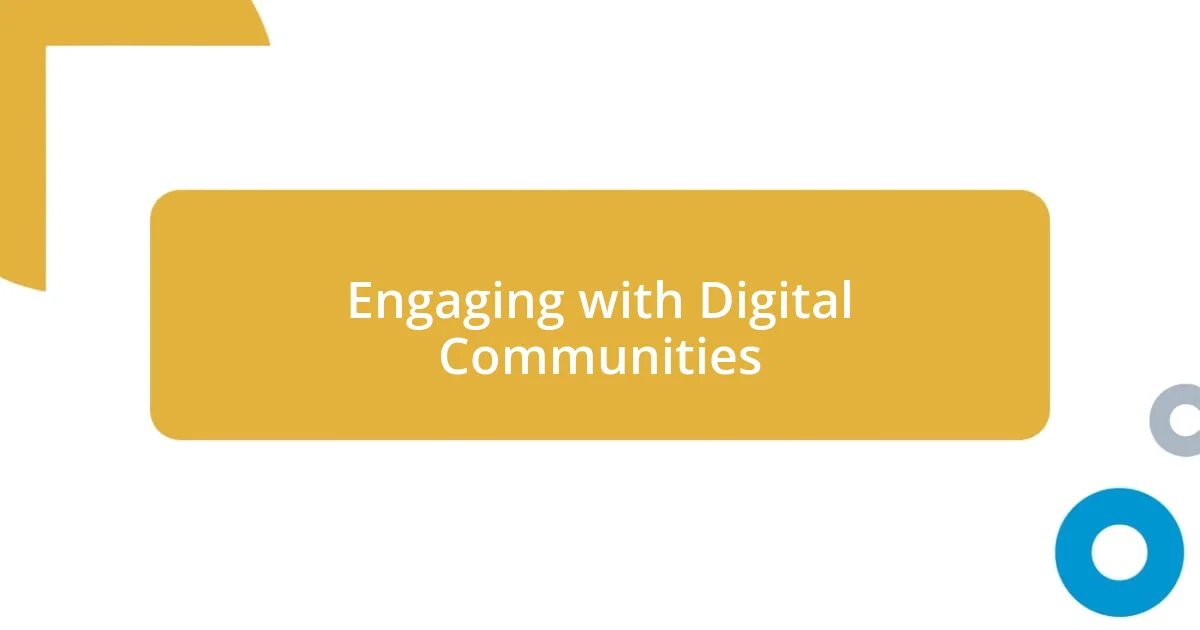
Engaging with Digital Communities
Engaging with digital communities is a multifaceted endeavor that often opens doors to meaningful connections. I recall a time when I participated in an online forum about digital history projects. It wasn’t just about sharing research; through the discussions, I found collaborators who brought fresh perspectives and unique skills. They challenged my ideas and encouraged a dialogic process that enriched my understanding of ethical practices.
As I navigate these digital spaces, I’ve also learned the significance of fostering trust within communities. When I shared my experiences in a group dedicated to oral history projects, I noticed how participants were eager to divulge their thoughts. This openness came from knowing that their contributions would be valued and respected. Have you ever felt more willing to share in a safe environment? I certainly have, and it underscores the ethical responsibility we hold—creating spaces where everyone’s voice matters.
Moreover, I’ve seen how engaging with digital communities can spark critical conversations about representation and ethics. During a webinar I attended, I watched as participants confronted difficult questions about whose stories get told in digital archives. The exchange was charged with emotion and urgency, leaving me invigorated to take action. Are we doing enough to ensure balanced narratives? It’s a question that resonates with anyone dedicated to digital history, reminding us of our collective responsibility.
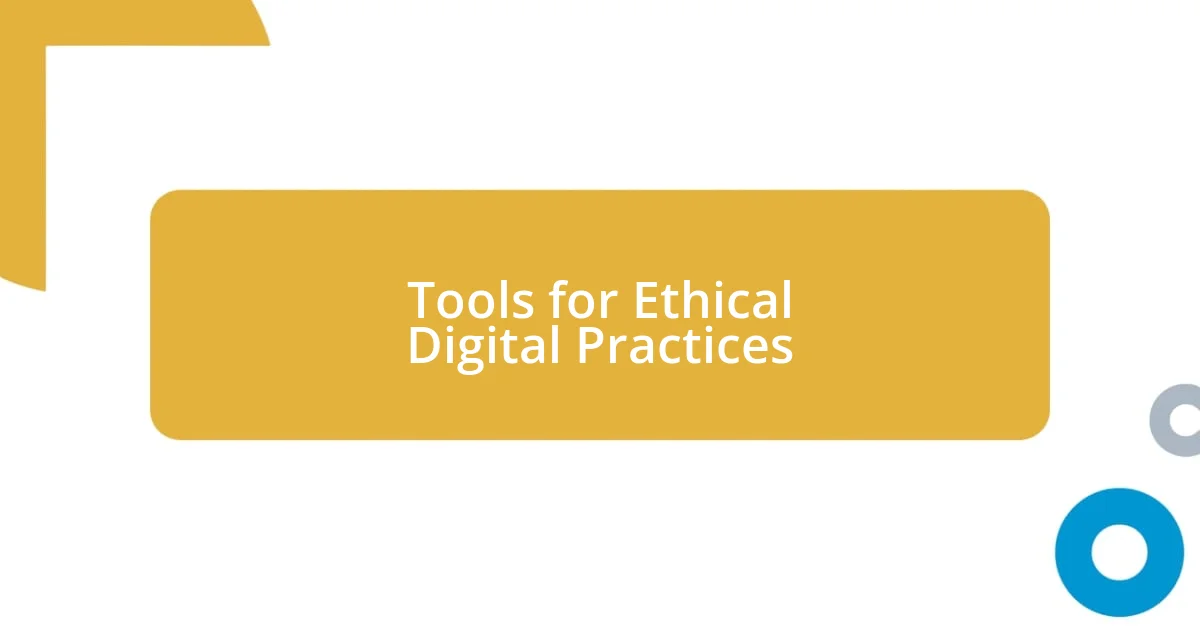
Tools for Ethical Digital Practices
One indispensable tool for ethical digital practices is the use of digital rights management (DRM) systems. I remember when I first came across this technology during a project focused on digitizing historical documents. Watching how DRM helped protect creators’ rights while still allowing access to valuable resources was enlightening. It prompted me to think: how do we strike the right balance between accessibility and protection in the digital age?
Another approach I’ve found beneficial comes from employing annotation tools within platforms. While working on a collaborative online project, I discovered how tools like Hypothesis can enrich our interactions with sources. We were able to highlight sections, add comments, and create dynamic conversations around historical texts. Have you ever noticed how learning can deepen when you see someone else’s perspective on a document? This shift from solitary to collective understanding redefined our approach to the material we were studying.
Additionally, embracing community guidelines for online engagement is crucial. During a group project, we adopted a code of conduct that established expectations for respectful discourse. I often reflect on how this framework shaped our discussions, enabling everyone to feel safe in voicing differing opinions. What a relief it was to have that foundation! It’s a reminder that ethical practice isn’t just about what we do in our research, but how we interact with others in the digital spaces we share.
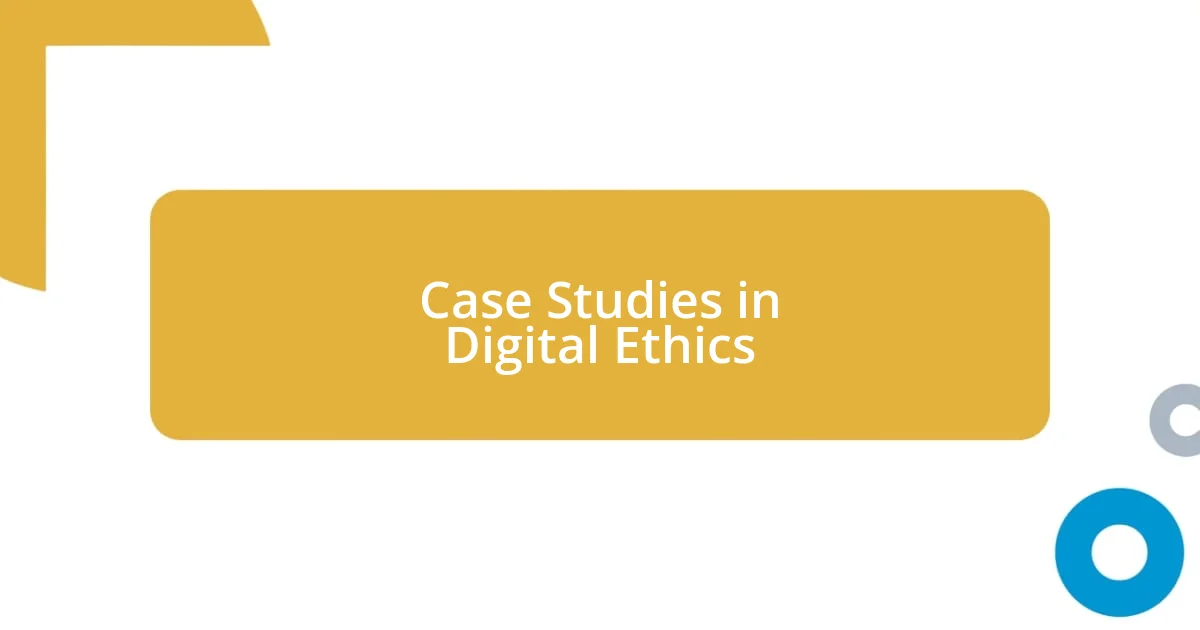
Case Studies in Digital Ethics
In exploring case studies in digital ethics, I think back to a project I was involved in where we digitized oral histories from local community members. Each participant had different levels of comfort regarding how their stories were shared. It made me realize—the ethical implications are profound. Are we truly honoring their narratives when we broadcast them online? This thought haunted me throughout the project, driving home the importance of consent and contextualization in our work.
Another striking example I encountered was during an analysis of a digital archive that included materials from marginalized voices. The backlash from the community about the misrepresentation of their stories was intense and heartfelt. I couldn’t help but empathize; their concerns resonated with my own experiences of feeling overlooked. It raised an important question for me: how can we ensure that digital spaces reflect diverse voices accurately and respectfully? I believe accountability is key, and that starts with listening and learning.
A particularly impactful case study emerged when a popular platform faced criticism for failing to properly credit content creators. Seeing public outcry on social media about this issue made me realize how digital ethics intersects with trust. I vividly remember a discussion I had with a colleague about the ripple effect this can have on future collaborations. Can we foster a collaborative spirit if creators feel unappreciated? I think it’s essential for us to build a culture of recognition and respect within our digital frameworks, ensuring that everyone feels valued.












